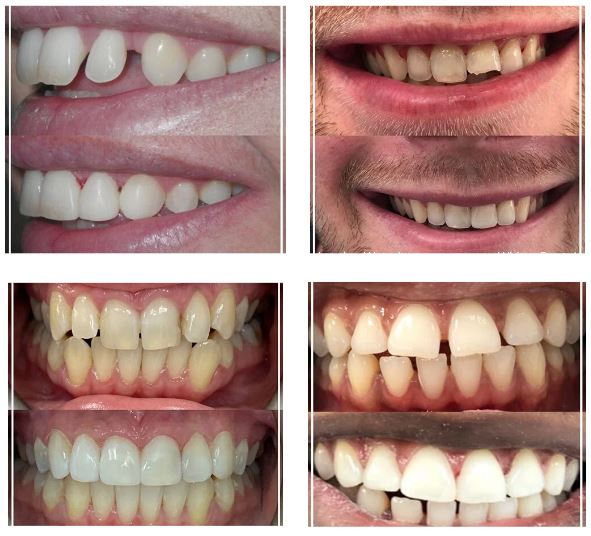Composite bonding is a popular cosmetic dental procedure that involves applying a tooth-coloured resin material to repair chips, cracks, or discolouration in teeth. Not only does it enhance the appearance of your smile, but it also restores the functionality of damaged teeth. In this article, we’ll delve into the intricacies of composite bonding, exploring its benefits, procedure, and most importantly, composite bonding’s price.
What is Composite Bonding?
Composite bonding, also known as dental bonding, is a procedure where a tooth-coloured resin material is applied to the surface of a tooth and sculpted into shape, hardened, and polished. It’s commonly used to repair chips, cracks, and discolouration, as well as to close gaps between teeth and even change their shape.
When it comes to enhancing your smile, composite bonding effectively addresses:
- Discolouration or staining of teeth
- Minor gaps and cracks
- Irregularities such as jagged or chipped teeth
From a dental health standpoint, composite bonding contributes to:
- Reinforcing weakened teeth
- Boosting confidence and overall mental well-being
- Providing protection against sensitivity, particularly for individuals with receding gums
Exploring the Advantages of Composite Bonding
Natural-looking results: Utilising carefully layered composite resin, bonding achieves a seamless appearance that closely resembles natural tooth enamel, blending flawlessly with your smile.
Minimal intervention, maximum impact: Unlike procedures such as veneers, composite bonding preserves more of the natural tooth structure, ensuring a minimally invasive treatment process with significant cosmetic improvements.
Cost-effective brilliance: Offering an affordable alternative to pricier treatments like veneers, composite bonding delivers impressive aesthetic enhancements without breaking the bank.
Quick and convenient: With treatment times often as short as an hour and typically requiring no follow-up appointments, composite bonding offers a swift and hassle-free solution for achieving a radiant smile compared to more time-consuming alternatives like veneers and crowns.
Aftercare Tips for Composite Bonding:
Immediate Care:
- Be cautious with your diet, avoiding hard or sticky foods that could dislodge the resin.
- Stay away from staining substances like coffee, red wine, and tobacco to prevent discolouration, especially during the first few days.
Long-Term Care:
- Maintain regular oral hygiene practices, including brushing twice daily, flossing, and using mouthwash.
- Protect your teeth from grinding by wearing a mouthguard or splint recommended by your dentist.
- Attend regular dental check-ups every six months for monitoring and professional cleaning to ensure the longevity of your composite bonding.
Composite Bonding: Witness the Transformation with Before and After Pictures
FAQ
How Much Does Composite Bonding Cost? Composite bonding costs vary based on multiple factors, including the dentist’s skill level, the complexity of the procedure, and the location. During your consultation, your dentist will provide a customised estimate tailored to your specific needs.
Does Composite Bonding Hurt? No! Composite bonding is a comfortable procedure that doesn’t require local anaesthetic. This is because it is usually an addition to your natural teeth, therefore we do not usually need to trim or polish your teeth during the procedure.
How Long Does Composite Bonding Take? Cosmetic bonding can take as little as thirty minutes and up to a few hours depending on the number of teeth being bonded and what your desired result is.
How Long Does Composite Bonding Last? Composite bonding typically lasts around five years. To maintain the longevity of your composite bonding, we recommend regular hygiene appointments, ideally every six months, and re-polishing of the composite every one to two years.
How much does dental bonding cost in the UK? Dental bonding prices in the UK can vary depending on the dental office and area. For precise costs for your composite bonding procedure, it is best to speak directly with your private orthodontist.
Can Composite Bonding be Removed or Reversed?
While composite bonding can be reversed, it’s crucial to discuss this with your dentist before making a decision. If needed, your dentist can safely remove the bonding material without causing harm to the tooth structure. This flexibility allows for adjustments or alternative treatments as necessary.
Composite bonding stands as a versatile and effective solution for enhancing both the aesthetics and functionality of your smile. With its natural-looking results, minimally invasive process, and cost-effectiveness, composite bonding offers a convenient and accessible option for achieving the radiant smile you desire. By following the provided aftercare tips and staying informed about the procedure and its potential costs, you can ensure the longevity and success of your composite bonding treatment. If you’re considering composite bonding, consult with a private dentist to explore how this transformative procedure can help you achieve your dental goals and boost your confidence for years to come.
Guest blogger

Our guest post blogspot features a wide and diverse range of guests who have written one-off blogs about different aspects of health and fitness. If you are interested in featuring on our guest blogspot, please contact us.













